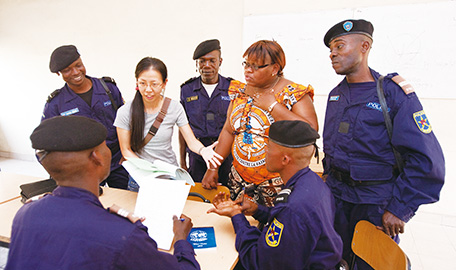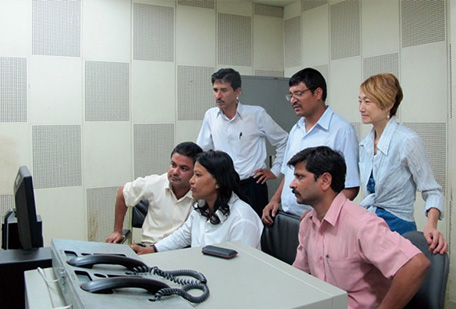Japan's Official Development Assistance White Paper 2013
(4) Policy Formulation and Institution Building
For the sustainable growth of developing countries, not only the establishment of the socio-economic infrastructure, but also the policy formulation, institution building, and human resource development are important.
It is essential to support eradicating corruption, legal and institutional reforms, improving the efficiency and transparency of public administration, and strengthening the administrative capacity of local governments.
<Japan’s Efforts>
As part of its support in policy formulation and institution building, Japan provides assistance for development of the legal system. Improvement of the legal system serves as the foundation for development of the country through self-help efforts that are based on good governance. Assistance for this sector is a typical example of person-to-person cooperation between Japan and the recipient countries, such as Indonesia, Viet Nam, Myanmar, Mongolia, Cambodia, Laos, Uzbekistan, and Bangladesh, and plays a role in the “the visibility of Japanese Aid.”

At the training site of the instructors for the police democratization. A JICA staff discussing the content of training with the instructors of the National Congolese Police after a training session. (Photo: Shinichi Kuno / JICA)
In addition, improvement of the legal systems in developing countries through such measures is an important effort as it will also improve the work environment for Japanese companies. Japan’s assistance for the improvement of legal systems comes through its “soft power,” and serves as the underpinning for strengthening the potential for the growth of the world, including Asia.
Moreover, for democratic development Japan supports the institution building for legal, judicial, administrative, public service, and police systems, support for the implementation of democratic elections, strengthening of civil society, and aid improvement of women’s status. Japan also provides support for the prevention of corruption, the development of statistical capabilities, and the enhancement of the abilities of local governments.
For the issues of criminal justice Japan also supports the training and seminars for professionals in criminal justice of developing countries in Asia and the Pacific through the United Nations Asia and Far East Institute for the Prevention of Crime and the Treatment of Offenders (UNAFEI). Trainings provided by UNAFEI include those concerning the treatment of female criminals with regard to human rights considerations.
Japan provides assistance for the policy formulation and institution building not only for specific projects, but also for financing the national accounts of local government.
In the area of capacity building of police agencies that constitute a cornerstone in maintenance of domestic security, Japan provides support with a combination of transfer of the knowledge and technology based on experiences of the Japanese police in international cooperation, and provision of equipment and maintenance of facilities, while emphasizing the development of human resources, including improvement of systems and enhancement of administrative capabilities. The National Police Agency (NPA) dispatches experts to and accepts trainees mainly from Asian countries such as Indonesia and the Philippines. Through this, Japan strives to transfer the attitudes, investigative abilities, and forensics technology of the democratically controlled Japanese police, who are trusted by the Japanese people.

A working session on civil law in Viet Nam. Articles of the Japanese civil law translated into Vietnamese are compared with the Vietnamese civil law article by article. (Photo: Mika Tanimoto / JICA)
●Nepal
Project for Promoting Peace Building and Democratization through the Capacity Development of the Media Sector in Nepal
Technical Cooperation Project (November 2010 - Ongoing)
In 2006, the Comprehensive Peace Agreement was signed in Nepal to finally put an end to the civil war that had continued for almost 10 years. Following the peace agreement, Nepal began the process of democratization and Japan has been providing assistance through JICA to enhance the capabilities of the national radio station, Radio Nepal. Japan is also assisting with the formulation of democratic media policies and related legislation. Within countries experiencing internal conflict, mass media is often used by political leaders to fan hatred towards their political opponents and to incite hostilities. For this reason, the establishment of neutral media that is not exploited by political leaders has been a key challenge of recent peacebuilding initiatives.
For a country approximately 1.8 times the size of Hokkaido, Nepal has a fiercely competitive media industry with over 364 FM radio stations, 24 TV stations and 5,648 newspapers and magazines. Nepal does not have a sufficiently large market to sustain such a large number of media outlets. It is therefore assumed that many of these media outlets receive financial assistance from political parties, political organizations and individual politicians. These media outlets only broadcast information that is advantageous to their sponsors, and therefore, have been a source of numerous political conflicts even since the signing of the peace agreement.
The project aims to equip the human resources of Radio Nepal with the ability to provide fair, impartial and accurate programming and reporting. One of the project’s outcomes has been the initiation of investigative journalism (investigating and revealing political and social injustices), a rarity in developing countries. Radio Nepal broadcasts are the widest reaching of any radio station in Nepal, and by setting a positive journalistic example, the influence of the station is starting to be seen in other media outlets.
(As of August 2013)

Radio Nepal staff receiving technical guidance on news reporting from a Japanese expert (Photo: JICA)
